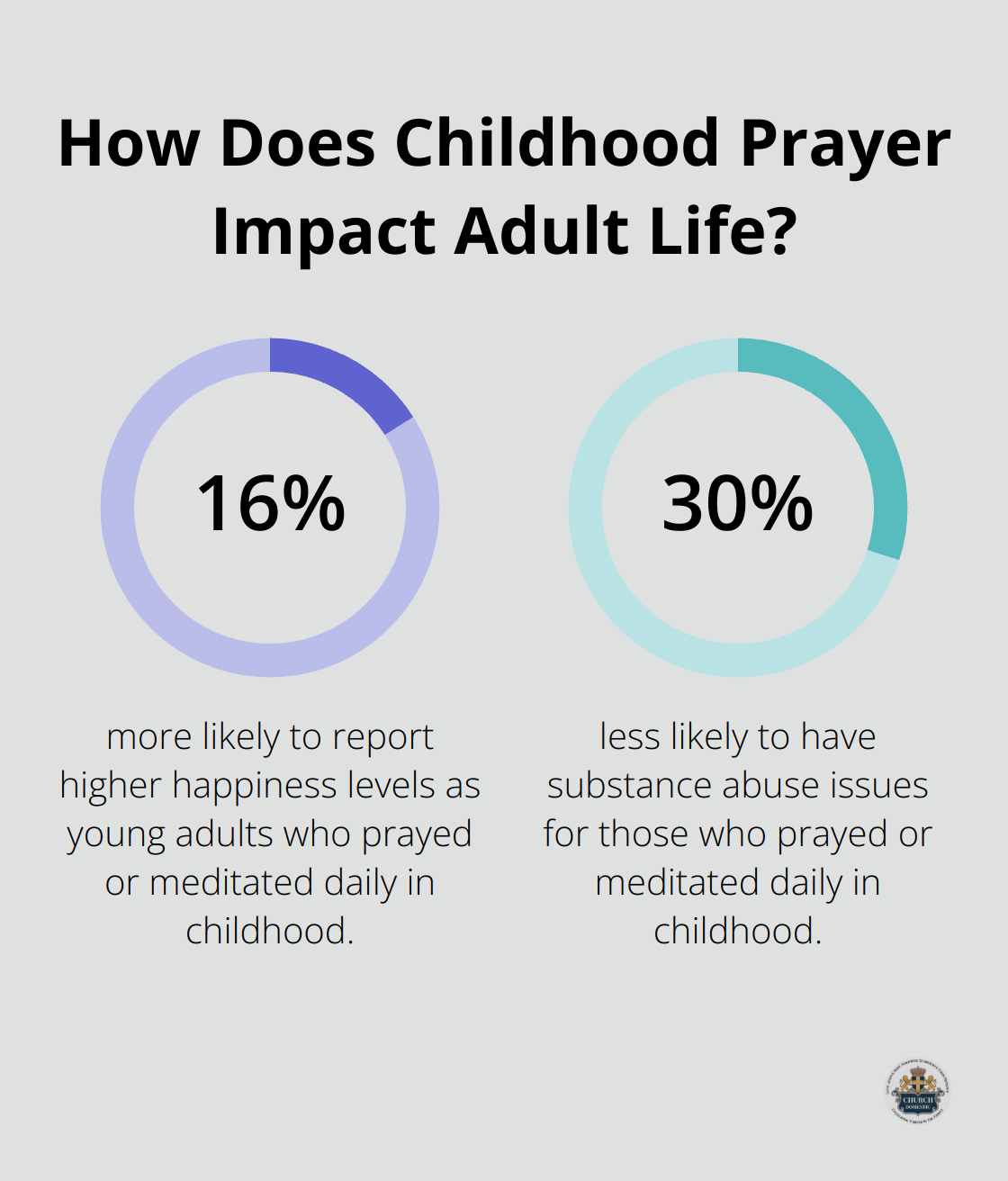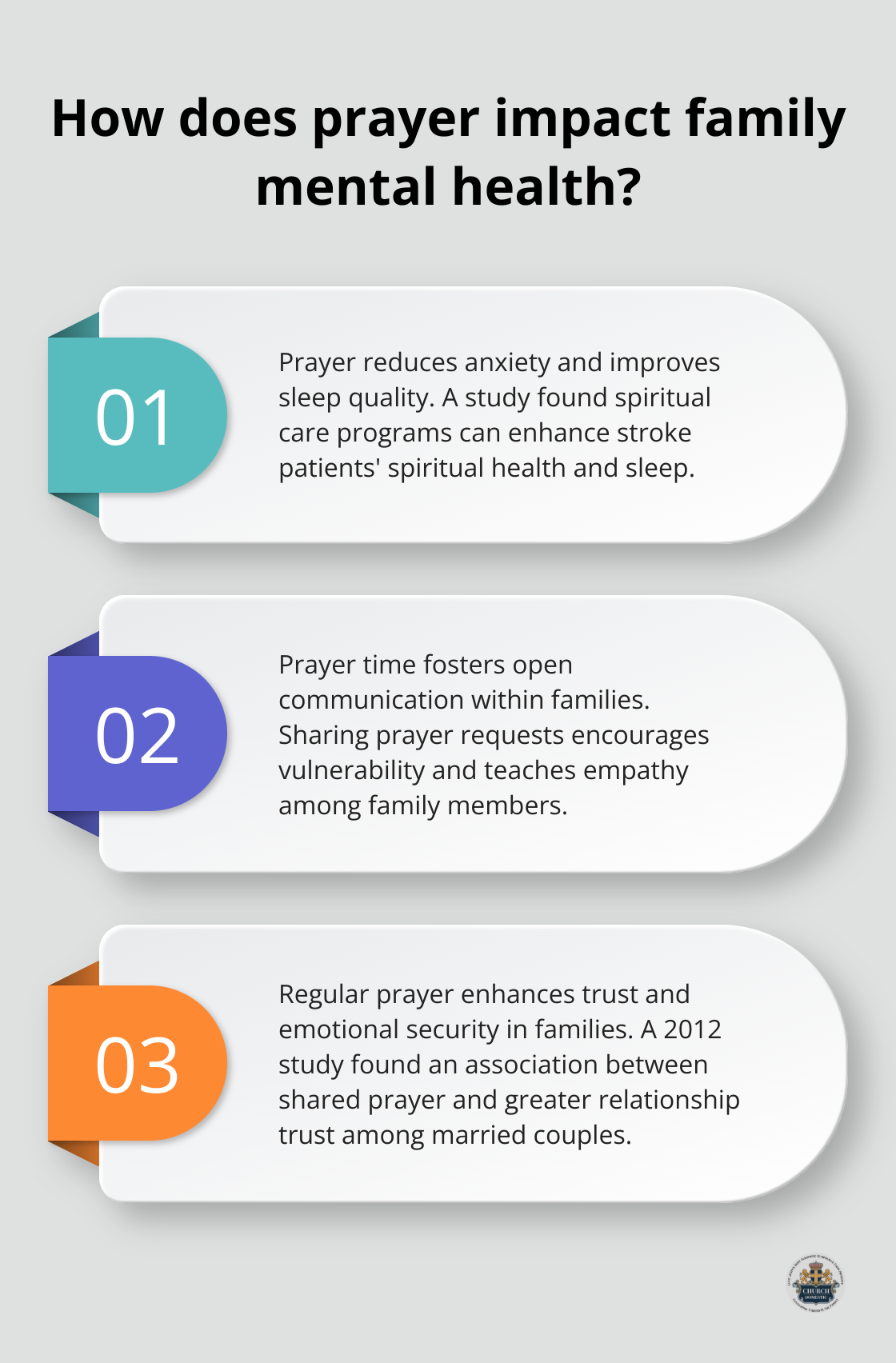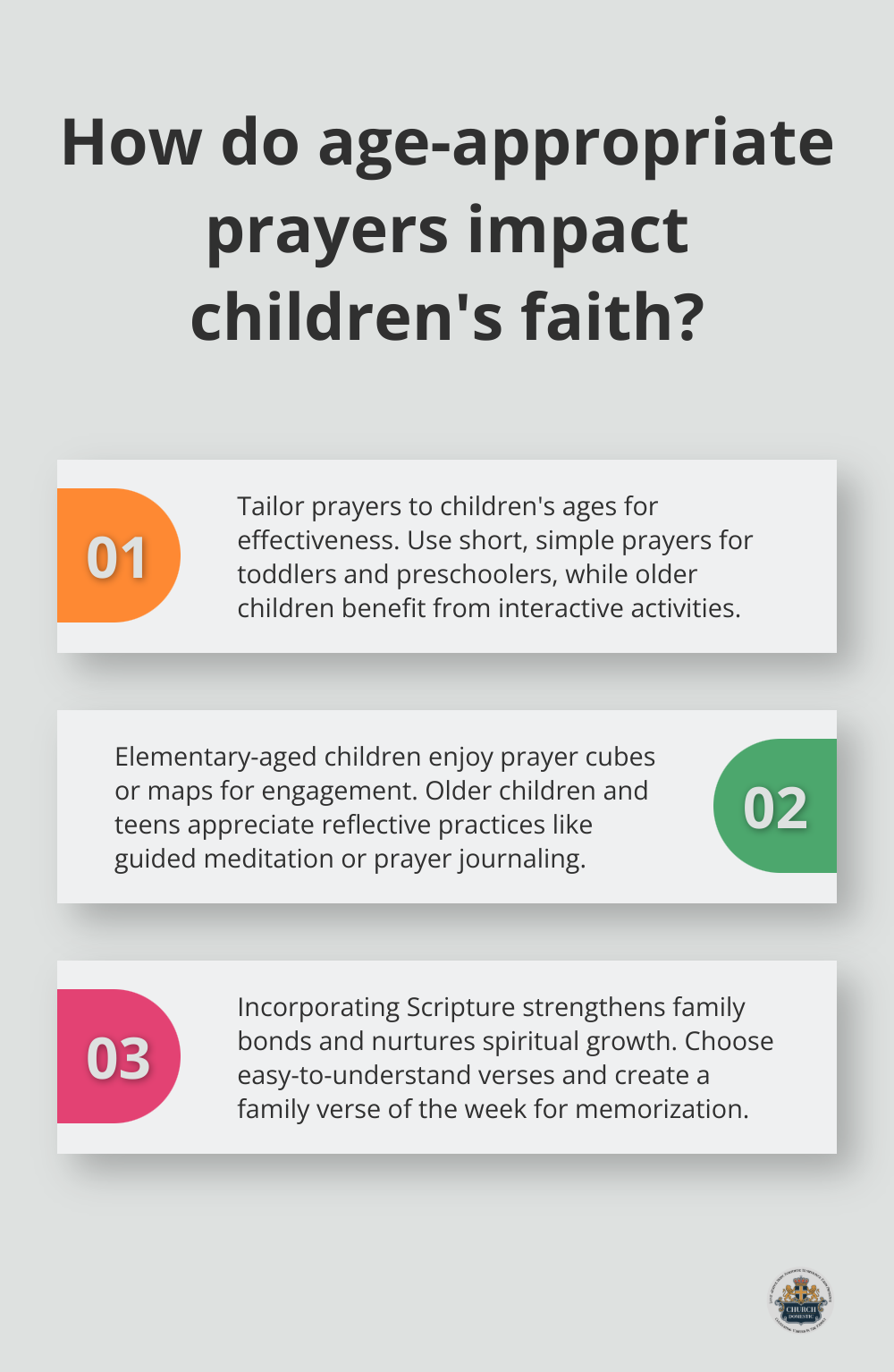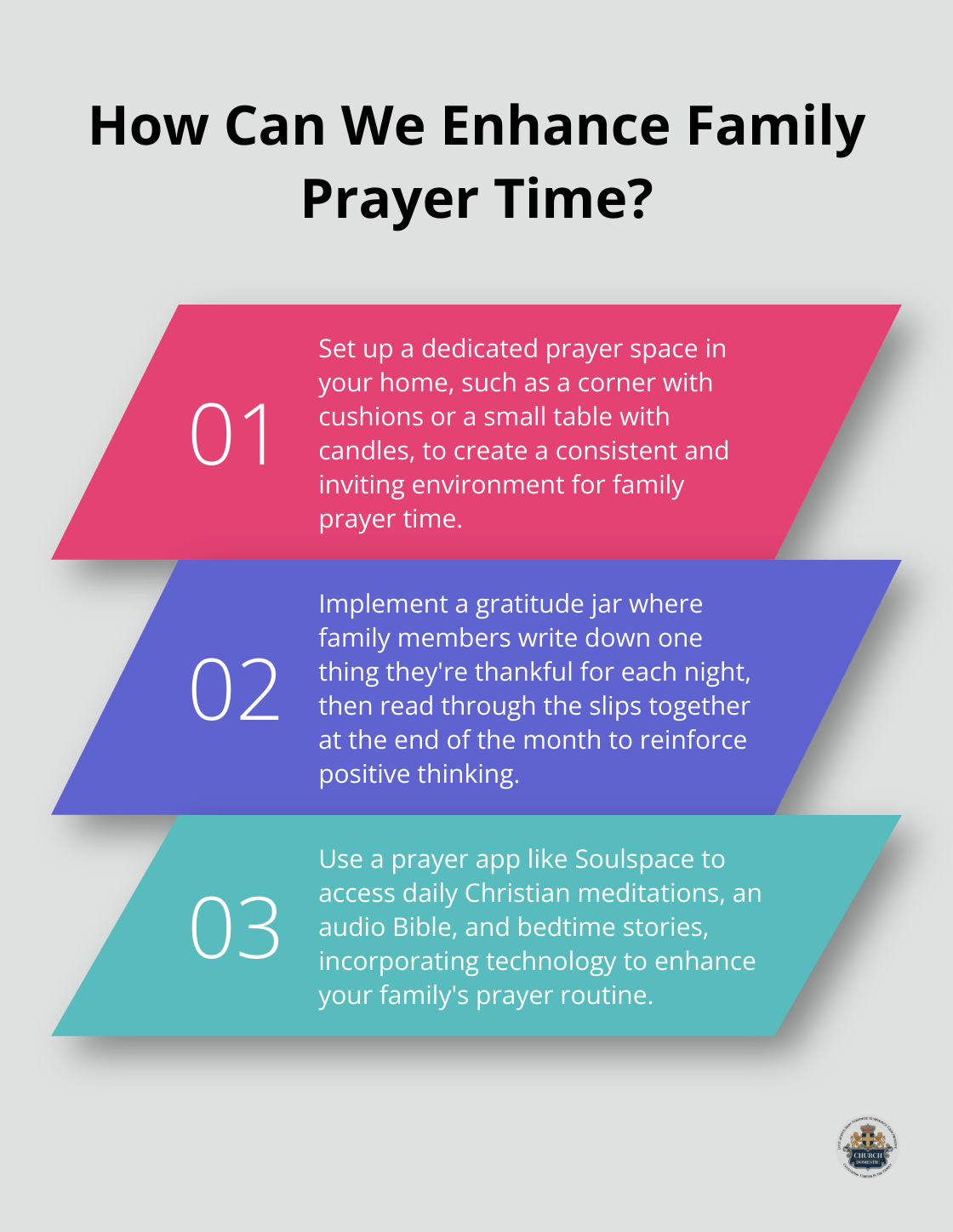At Church Domestic, we believe in the power of bedtime prayers to strengthen family bonds. This simple yet profound practice can create a lasting impact on your family’s spiritual and emotional well-being.
Bedtime prayers offer a unique opportunity to connect with God and each other at the end of each day. In this post, we’ll explore the benefits of this tradition and provide practical tips to help you incorporate it into your family routine.
How Bedtime Prayers Transform Family Life
Creating a Sacred Space
Bedtime prayers carve out a sacred space in your daily routine. This dedicated time allows families to pause, reflect, and connect with God together. It’s a moment to shed the day’s worries and focus on what truly matters.

A study by the National Institute of Family Studies found that families who engage in regular spiritual practices report higher levels of communication and connection. When you set aside time each night for prayer, you not only talk to God – you open lines of communication within your family.
Teaching Gratitude and Reflection
Bedtime prayers offer a unique opportunity to teach children the importance of gratitude and reflection. Ask each family member to share one thing they’re thankful for from the day. This practice helps shift focus from what went wrong to what went right, which fosters a positive mindset.
For younger children, consider using a gratitude jar. Each night, write down one thing you’re grateful for on a slip of paper and add it to the jar. At the end of the month, read through them together as a family. This tangible representation of blessings can prove incredibly powerful.
Building a Foundation for Lifelong Faith
Consistency plays a key role in bedtime prayers. When you make it a nightly habit, you lay the groundwork for lifelong faith practices. A study tracking over 5,000 adolescents showed that those who prayed or meditated daily in childhood were 16% more likely to report higher happiness levels as young adults, and 30% less likely to have substance abuse issues.
To make bedtime prayers stick, try incorporating them into your existing routine. For example, if you already read a bedtime story, follow it up with a short prayer. Over time, this will become a natural part of your evening (as ingrained as brushing teeth or putting on pajamas).
Bedtime prayers don’t have to be long or elaborate. Even a simple “Thank you, God, for this day” can be powerful when said consistently. The goal is to create a habit of turning to God at the end of each day, which sets a foundation for deeper spiritual practices as your children grow.
Enhancing Emotional Connection
Bedtime prayers provide a unique opportunity for families to connect emotionally. This quiet time (free from the distractions of screens and daily tasks) allows for genuine sharing and listening. Parents can use this time to understand their children’s concerns, fears, and joys, while children learn to express themselves in a safe, loving environment.
Research indicates that families who pray together often report stronger emotional bonds and improved communication. This nightly ritual can serve as a reset button, allowing family members to let go of any tensions from the day and reconnect with each other on a deeper level.
As we explore the psychological benefits of family prayer time in the next section, you’ll discover even more ways that this simple practice can strengthen your family bonds and promote overall well-being.
How Prayer Boosts Family Mental Health
Prayer does more than strengthen spiritual bonds-it offers significant psychological benefits for the entire family. This simple practice can transform family dynamics and individual well-being.
Anxiety Reduction and Better Sleep
A recent study found that a spiritual care program can effectively improve stroke patients’ spiritual health and sleep quality. This suggests that incorporating spiritual practices like prayer into daily routines may have positive effects on sleep and overall well-being for various populations.

To maximize these benefits, incorporate deep breathing exercises into your prayer time. Encourage family members to take slow, deep breaths while praying, focusing on inhaling peace and exhaling worries. This combination of prayer and mindfulness creates a powerful relaxation effect, setting the stage for restful sleep.
Open Communication Channels
Prayer time provides a unique opportunity for open, honest communication within the family unit. When family members share their prayers aloud, it often leads to discussions about hopes, fears, and challenges that might not come up in day-to-day conversations.
To foster this openness, implement a “prayer request” time where each family member can share something they’d like others to pray for. This practice not only encourages vulnerability but also teaches empathy as family members learn to support each other through prayer.
Building Trust and Emotional Security
Regular prayer time can significantly enhance trust and emotional security within the family. When children see their parents turn to prayer in times of stress or uncertainty, it models healthy coping mechanisms and reinforces the idea that there’s always support available-both divine and familial.
A 2012 study found an association between shared prayer and greater levels of relationship trust among married couples. To build on this, try incorporating affirmations into your prayer time. After praying for each family member, share one thing you appreciate about them. This practice reinforces positive bonds and helps create a secure emotional environment.
Cultivating Gratitude and Positivity
Prayer often involves expressing gratitude, which can have profound effects on mental health. Research shows that practicing gratitude (through prayer or other means) can increase happiness, reduce depression, and improve overall life satisfaction.
Encourage your family to include specific expressions of thanks in their prayers. This could be for big things (like good health) or small daily joys (like a delicious meal). Over time, this practice trains the brain to notice and appreciate the positive aspects of life, leading to a more optimistic outlook.
As you explore these psychological benefits of family prayer, you’ll discover practical ways to implement this powerful practice in your own home. The next section will provide concrete tips and strategies to make bedtime prayers a meaningful and consistent part of your family routine.
How to Make Bedtime Prayers a Family Habit
Tailor Prayers to Your Children’s Ages
For toddlers and preschoolers, use short and simple prayers. A rhyming prayer or a call-and-response format works well. You might say, “God is great,” and have your child respond, “God is good.” As children grow older, encourage them to add their own words of thanks or requests.

Elementary-aged children often enjoy interactive prayer activities. Try a prayer cube with different prompts on each side, or use a map to pray for different countries. Older children and teens might appreciate more reflective practices, such as guided meditation or journaling their prayers.
Incorporate Scripture into Your Routine
Incorporating Scripture into your family prayer routine strengthens family bonds, nurtures spiritual growth, promotes emotional well-being, builds resilience, and fosters gratitude and appreciation. Read a short Bible verse before prayer to provide focus and inspiration. Choose verses that are easy to understand and remember. For younger children, use a children’s Bible with illustrations to keep them engaged.
Create a family verse of the week. Write it on a chalkboard or whiteboard in a common area, and include it in your nightly prayers. This repetition helps reinforce the message and makes Scripture memorization a natural part of family life.
Use Technology for Prayer Tracking
While it might seem counterintuitive to use technology during a spiritual practice, prayer apps can become valuable tools for families. Soulspace’s Prayer & Meditation app provides daily Christian meditations, an audio Bible, bedtime Bible stories & music with a focus on calm and reflection.
For a low-tech option, create a family prayer jar. Throughout the week, family members can write down prayer requests on slips of paper and add them to the jar. During bedtime prayers, draw out a few requests to pray for together.
Create a Sensory Prayer Experience
Engage multiple senses to make prayer time more memorable. Light a scented candle to signal the start of prayer time. Use soft background music to create a calming atmosphere. For tactile learners, provide prayer beads or smooth stones to hold during prayer.
Consistency plays a key role when you establish any new habit. Start small – even just a minute or two of prayer each night – and gradually increase the time as it becomes a natural part of your routine. With patience and persistence, bedtime prayers can transform into a cherished family tradition that strengthens bonds and deepens faith.
Final Thoughts
Bedtime prayers offer a powerful way to strengthen family bonds and nurture spiritual growth. This simple practice can transform family life, reduce anxiety, improve sleep, and foster open communication. Families can build a foundation for lifelong faith and emotional security by creating a sacred space for reflection and gratitude.

We urge you to start or strengthen your family’s bedtime prayer routine. Consistency matters most; even a few minutes each night can significantly impact your family’s spiritual and emotional well-being. As you incorporate Scripture, age-appropriate activities, and technology into your prayer time, you’ll create a meaningful ritual that resonates with every family member.
The long-term impact of bedtime prayers on family bonds and spiritual growth is profound. Children will carry these moments of connection and faith with them, shaping their worldview and relationships. At Church Domestic, we believe in the power of intentional family practices to strengthen relationships and deepen faith (and we hope this guide inspires you to make bedtime prayers a cherished part of your family routine).